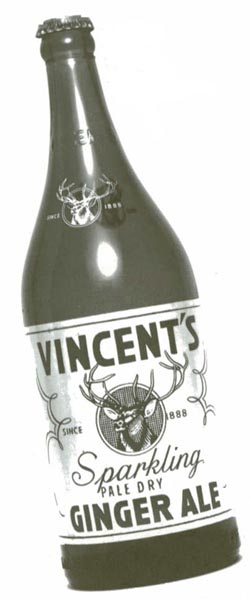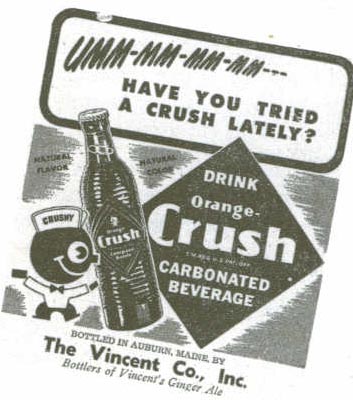~ Kathy's Corner ~
Vincent's Beverages, and
Sunset Beverages, Lewiston, Maine
 In
1888, a pair of ambitious retail clerks, Regis Provost and Sabin Vincent,
founded the Lewiston Soda Beer Company at 31 Chestnut Street in Lewiston,
Maine. The "beer" was misleading, as it was a nonalcoholic beer, or
"soft beer", as an 1893 ad would describe it. Their stock in trade
was soda and mineral water.
In
1888, a pair of ambitious retail clerks, Regis Provost and Sabin Vincent,
founded the Lewiston Soda Beer Company at 31 Chestnut Street in Lewiston,
Maine. The "beer" was misleading, as it was a nonalcoholic beer, or
"soft beer", as an 1893 ad would describe it. Their stock in trade
was soda and mineral water.
Within three years, the partners made a move to
the New Auburn section of Auburn, Maine. Regis Provost passed away around
1905, and the firm acquired a new name, the Vincent Bottling Company. It
was later shortened to just the Vincent Company in 1914.
Sabin had four sons, two of which became very
active in the bottling business. Louis, also called "Louie", joined
the firm in 1909. Older brother Zephirin followed him a year or so later, and
was the company's manager, with Sabin as President, by 1912.
In 1913, Sabin retired and Zephirin became the
company's head. Under his leadership, the Vincent Company landed a major
account, the rights to bottle Coca-Cola, around 1917. Soon thereafter, they
became the agents for Moxie as well.
With both Coca-Cola and Moxie, as well as Orange
Crush, Nu-Icy and a full line of their own Vincent Beverages, it was hard to
go wrong, and Zephirin didn't. He constructed a brand new state-of-the-art
plant where South Main, Mill and Pulsifer Streets meet in the year 1927.
Zephirin died unexpectedly on Christmas Eve in
1931. Now it was Louie's turn to run the company, and considering the changing
economies of bottling, he did well.
Ninety-year-old Val Tardif, who remembers the
happenings around Auburn, recalls one mistake that Louie did make in the late
30s when a representative from Coca-Cola headquarters offered him $20,000
to buy back the area's rights to bottle Coca-Cola. As Val recounts, Louie
thought it was no great loss because "you can't give Coca-Cola away
in the winter." 
In retrospect, it was not a smart move. Perhaps
it was a reflection of Louie's confidence in his own lineup of Vincent's
Beverages. Val Tardif even agrees with this when recalling Vincent's Ginger
Ale as a "good number" and remembers it being advertised on the
radio all the time during the early years of the 40s.
The Vincent Company carried on through the 40s and
50s, replacing Coca-Cola with Royal Crown Cola. Orange Crush and the Vincent
Beverages lineup continued doing well. The company, however, suffered from a
lack of unity in the family. Discord and infighting weakened the firm's
chances for survival in what was a vicious soft drink world as it was.
Louie Vincent elected to fold the Vincent Company
in 1962-63. Today, the impressive 1927 state-of-the-art bottling plant still
stands. It is in what is known as Hulett Square, and is still impressive as
the home of Waterrest Waterbeds.
 Still
in Auburn, Maine, north along Washington Avenue (Routes 100 and 202), you will
notice Sunset Poultry to the right and Sunset Motel to the left. Not so long
ago, you would have noticed another Sunset, Sunset Beverages.
Still
in Auburn, Maine, north along Washington Avenue (Routes 100 and 202), you will
notice Sunset Poultry to the right and Sunset Motel to the left. Not so long
ago, you would have noticed another Sunset, Sunset Beverages.
Actually, Sunset Beverages was "born" in
Portland, where it was bottled by Joe Pio from 1938 to 1945. Then came along
Gerry Bilodeau, who was bottling and distributing Pepsi-Cola in the Auburn
area. Deciding he could do better with a brand of his own, Gerry bought out
Joe Pio and moved the machinery to Auburn, where he set up shop at 571
Washington Avenue.
Gerry, with much help from his wife Jeanne, ran
Sunset Beverages for a decade. Mostly things were good.
Bilodeau was a flying buff, with a Cessna parked behind
the bottling plant. If a customer bought a bottle of Sunset Beverages with a
"Free Ride" cap, all he or she had to do was show up there, and
Gerry would take them for a gratis flight.
Sunset Beverages also distributed Clicquot Club
beverages for a number of years. When it came parade time, or other public
functions, Bilodeau dressed his young son as the Clicquot Eskimo for the
festivities.
There were bad times too, when a fire did serious
damage to the plant in November of 1951. But the infamous disaster was the
wire-brush incident in November, 1952, when Irene Lajoie drank a bottle of
Sunset Ginger Ale and claimed she became ill because there was a rusty wire
brush in the bottle. She and her husband sued, and the press picked up the
story.
Although Gerry Bilodeau explained convincingly
that a brush in a bottle was impossible and the jury awarded the Lajoies only
a fraction of what they had asked, the result was still not exactly the
sort of publicity a small business wants or needs.
In 1953, Gerry and Jeanne opened the Sunset Motel
- the same year that their second son was born. Something had to give, and the
Bilodeau's decided it should be the bottling business.
In April of 1955, Sunset Beverages was sold to
Gerry's brother, Ernest "Blackie" Bilodeau, who had eight years
experience with Mount Zircon Beverages in Rumford.
While continuing to bottle Sunset Beverages,
Blackie also increasingly aligned himself with Nehi and Royal Crown Beverages.
The name of the company, in fact, was changed to Nehi Beverages in the late
50s, and then to Royal Crown Beverages in the early 70s.
Shortly after that, Blackie sold the business to
Gould and Scammon, an Auburn shoe machinery manufacturer, which ended Sunset
Beverages' last chapter.
Both of these company's bottles are listed in
"Collecting Applied Color Label Soda Bottles, Third Edition", a book
produced thought the PSBCA.